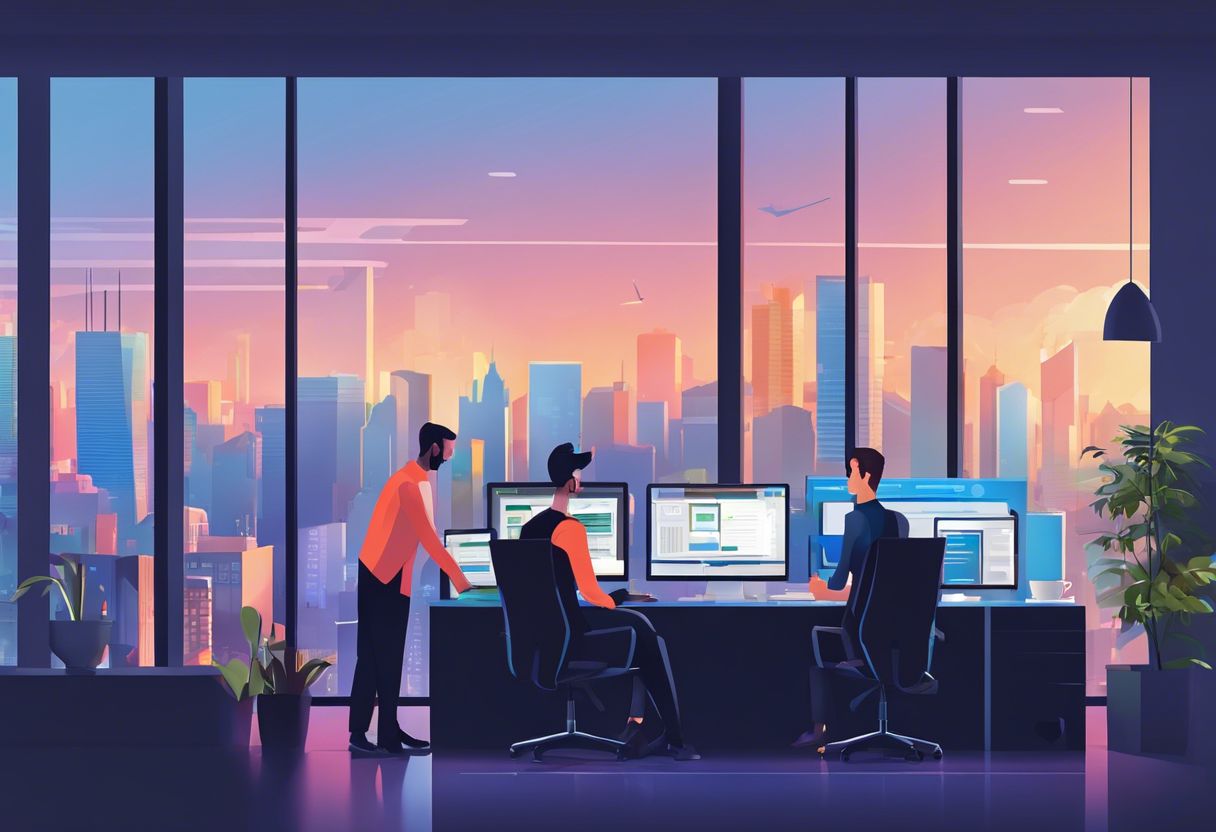Hiring a Web Developer: Find the Right Pro for You

Hiring a web developer is like picking the perfect teammate for your online game. These pros make websites that look great and work smooth. Web developers are super important now because most of us go online to shop, learn, and play games.
They help businesses shine on the internet, show up in Google searches easily, and keep their websites safe.
There are different kinds of web developers. Some work on making the website pretty and easy to use; we call them front-end developers. Others are like wizards who do all the complicated stuff behind the scenes – they’re back-end developers.
Then there’s full-stack developers who can do both jobs!
When you need a web developer, think about what your project really needs, what your business is all about, who wants to visit your site, and if you want someone just for this job or to join your team for good.
The skills these tech heroes have include speaking computer languages like Java or Python and being able to solve tough problems nicely with others.
Nowadays everyone’s talking about new stuff happening in tech that could help your business stand out.
Choosing a web developer isn’t just matching names from a list; it’s knowing what you want in detail, finding people with those skills, checking their past projects carefully, and talking with them first.
Let’s not forget money matters! Hiring experts cost cash but remember quality counts too! Getting together with an expert can be around $500k every year but freelancers might ask between $100-$180 per hour instead.
Once you decide whom to get on board — say hello right! Teach them how cool your company is from day one and chat clear so everyone stays happy!
Web devs can spark magic for small businesses – let’s find out how they turn ideas into reality!
Understanding the Role of a Web Developer

Web developers play a crucial role in creating and maintaining websites, ensuring functionality and user experience. They are responsible for coding, designing, and implementing web solutions that align with your business needs and target audience.
What Web Developers Do

We all want our websites to look great and work smoothly. That’s where web developers come in. They use special codes like HTML, CSS, and JavaScript to build everything you see online – from simple web pages to fancy apps.
These pros make sure that when someone visits your site, it looks just right and is easy to use.
Web developers spend their days writing the code that tells a website how to function. They team up with designers who make things look nice, figuring out how best to turn those designs into a real, working website.
And if something goes wrong or could be better on your site, they dig into the problem and fix it.
Our job as small business owners is easier thanks to web developers. They take care of creating a place online where our customers can find us. With their help, we can focus more on growing our businesses while they handle the digital side of things!
The Importance of Web Developers in Today’s Digital World

Web developers do much more than create websites; they are key players in the digital world. They take ideas and turn them into stunning, easy-to-use online spaces that attract customers and keep them coming back.
Whether you’re selling products or sharing information, a web developer can make your website look great and work smoothly.
With most of our lives moving online, having a strong web presence is no longer just nice to have—it’s necessary. Web developers help businesses shine on the internet by building sites with amazing user experiences and responsive designs that look good on any device.
They know how to use coding languages like HTML, CSS, and JavaScript to make sure your site stands out from the crowd.
Our daily life now relies heavily on digital technology, so we need web developers more than ever. They understand web design principles that grab users’ attention from their first click.
Plus, they keep up with current trends such as mobile app development to help you reach people wherever they are.
Types of Web Developers

Web developers come in different types, each specializing in specific areas of website development. Understanding the differences between front-end, back-end, and full stack developers can help you determine which type is best suited for your project needs.
Front-End Developers

We understand that having a great-looking website is key to drawing in customers. That’s where front-end developers step in. They team up with designers to make sure the visual parts of your site are stunning.
These pros use HTML, CSS, and JavaScript—tools for building websites—to create everything you see when you visit a webpage, like the layout and graphics.
Front-end developers focus on user experience too—making sites easy for visitors to use and enjoy on computers or phones. They turn tech talk into real results: fast-loading pages that look good on any screen and work well with different web browsers.
With their help, your business can shine online, impressing your audience right from the start.
Back-End Developers

Back-end developers are like the architects behind a building, but for websites and apps. They focus on the technical construction, ensuring everything works smoothly behind the scenes.
Their work involves managing databases, scripting server-side functions, integrating APIs, and maintaining servers to keep everything running efficiently. These developers also take charge of system architecture and play a significant role in security protocols, making sure your website or app is safe from cyber threats.
When hiring a back-end developer for your web project, it’s important to consider how their skills align with your specific needs. Look for expertise in coding languages such as Java, Python, or Ruby as well as experience in data storage and retrieval.
Full Stack Developers

Full stack developers play a vital role in creating and managing websites. They are versatile programmers who handle both front-end and back-end web development tasks. With expertise in various coding languages, full stack developers integrate the visual elements of a website with its functionality, ensuring a seamless user experience.
They are crucial for maintaining a digital entity’s overall performance and appearance by collaborating with other developers to achieve efficient frontend and backend integration.
Becoming a full stack developer requires mastery of essential coding languages and technologies, providing career opportunities in software engineering versatility.
Determining Your Needs

When determining your web developer needs, it’s important to consider the scope of your project, the type of business and target audience you have, as well as whether an in-house developer, freelance developer, or web development company is the right fit for you.
Understanding these factors will help you find a skilled professional who can meet your specific requirements.
Scope of Your Project

When defining the scope of your project, it’s crucial to clearly outline the requirements and objectives. Consider the complexity, features, and functionality needed for your website.
Determine the structure and design scope while considering the development needs and parameters specific to your business.
To avoid miscommunications with web developers during hiring, ensure a clear understanding of your project’s specifications before starting. This will help streamline the process as you search for a professional who can meet your specific needs effectively.
Type of Business and Target Audience

Understanding the type of business you have and the preferences of your target audience is crucial when deciding on the right web developer for your project. As small business owners, it’s important to consider your customer demographic, client base, and market segment.
By understanding consumer preferences and aligning them with your website design, you will effectively cater to the needs of your audience and create a platform that resonates with them.
Identifying your unique brand identity and ensuring it appeals to your target market are key factors in building a successful website that speaks directly to your customers.
In-House vs. Freelance vs. Web Development Company

Determining Your Needs is crucial before choosing the type of web developer for your project. Here’s a breakdown for small business owners:
- In-House Web Development:
- Ideal for long – term web development needs and complex projects.
- Offers dedicated attention to your projects and immediate support but can be costly.
- Freelance Web Developers:
- Best for project – based web development and budget considerations.
- Typically self – employed, they offer flexibility and cost savings but may have limited resources.
- Web Development Company:
- Suitable for businesses with financial expectations and professional web developer selection.
- Offers a wide range of expertise, high scalability, but may come with a higher price tag.
Essential Skills to Look For

When hiring a web developer, be sure to look for essential hard and soft skills such as proficiency in programming languages, strong communication abilities, creativity, and problem-solving skills.
To find out more about what qualities to prioritize when looking for the right web developer for your project, keep reading!
Hard Skills: Programming Languages and Frameworks
When hiring a web developer, it’s essential to look for these hard skills:
- Mastery of programming languages like Java, Python, C++, and JavaScript.
- Proficiency in database management systems and SQL knowledge.
- Understanding of object – oriented design and integrated development environments.
Soft Skills: Communication, Creativity, and Problem Solving
When hiring a web developer, consider the soft skills of communication, creativity, and problem-solving. These skills are crucial for successful collaboration and innovative thinking. Recognize their importance in the workplace by understanding what they encompass:
- Communication: Effective communication is key for seamless teamwork and project management. Look for developers who can clearly convey ideas, actively listen, and adapt their communication style to suit different contexts.
- Creativity: Web development often requires out-of-the-box thinking to solve complex problems and enhance user experience. Seek developers who demonstrate creative flair in their approach to design, functionality, and user interface.
- Problem Solving: The ability to tackle challenges with critical thinking and resourcefulness is invaluable in web development. Seek developers who can analyze issues from multiple angles and devise efficient solutions.
- Adaptability: A developer’s capacity to pivot in response to evolving project demands and technological advancements is essential for keeping your digital presence competitive.
- Collaboration: Look for candidates who thrive in team settings, contribute positively to group discussions, and respect differing opinions for effective collaboration.
- Innovation: Seek developers who demonstrate a proactive stance toward technological advancements and are eager to integrate new tools or methods into their work.
- Leadership Skills: While not always necessary depending on the role, leadership skills can elevate a candidate’s ability to guide a project or mentor others within a team setting.
Web Technologies and Trends: What’s Hot Right Now

Web development is constantly evolving, with several key trends driving the industry forward. In 2023, small business owners can expect to see a surge in artificial intelligence (AI) integration, enabling websites to offer personalized user experiences and streamline backend processes.
Low-code and no-code tools are gaining momentum, allowing businesses to develop web applications without extensive programming knowledge. The Internet of Things (IoT) is also becoming increasingly prevalent in web development, facilitating seamless connectivity between devices.
Cloud computing continues to revolutionize web technologies by providing scalable and flexible infrastructure for online operations. Moreover, automated code reviews are streamlining the development process while ensuring adherence to best practices.
Advanced AI is opening up new possibilities for enhancing website functionality and user engagement.
The Hiring Process

Creating a Detailed Job Description and Where to Find Qualified Web Developers are crucial steps in the hiring process. It’s important to assess portfolios and conduct interviews to ensure you find the right fit for your web development needs.
Creating a Detailed Job Description
We all know that finding the right web developer for your small business is crucial. That’s why creating a detailed job description is essential. Using a job description template tailored to the web developer role can help you outline responsibilities, qualifications, and required skills.
It’s also important to include the design essentials, such as knowledge of specific programming languages and frameworks, as well as practical experience in building websites or applications.
Be sure to highlight these details clearly in your job posting – from responsibilities and skill set to salary and requirements.
Where to Find Qualified Web Developers
After creating a detailed job description, the next step is finding qualified web developers. There are numerous online platforms and websites where small business owners can find and hire skilled web developers.
These platforms provide a range of options for employers to choose from when seeking the right professional for their project. Some of the popular platforms include Toptal, Upwork, Fiverr, and many others which connect businesses with experienced freelancers or software engineers specializing in web development.
These online avenues facilitate the hiring process for web developers by offering access to a diverse pool of talent while providing transparency through reviews, ratings, and portfolios.
Small business owners can effectively navigate these sites to identify qualified candidates who meet their specific requirementsregarding skills, experience levels, and budget constraints.
Assessing Portfolios and Conducting Interviews
When assessing portfolios and conducting interviews, as small business owners, it’s essential to thoroughly evaluate the candidates to ensure they have the necessary skills and experience. Here are some key steps to consider:
- Review Their Portfolios: Look for diversity in projects, creativity in design, and functionality in development. Pay attention to the technologies and frameworks utilized.
- Assess Technical Skills: Conduct a coding proficiency test or a skills assessment to gauge their programming abilities and problem-solving approach.
- Evaluate Employment History: Examine their employment history to identify consistency, growth, and relevant experience with different types of projects.
- Conduct In-Depth Interviews: Ask detailed questions about specific projects they’ve worked on, their role in those projects, and how they handled challenges.
- Test Communication Skills: Assess their ability to communicate complex technical concepts in simple terms and their capacity for teamwork.
- Consider Skillset Demonstration: Request candidates to walk you through a recent project citing the challenges faced, decisions made, and the overall outcome.
- Check References: Reach out to previous employers or clients to gain insights into the candidate’s work ethic and performance.
- Cultural Fit Assessment: Determine if the candidate aligns with your company culture and values through open-ended conversations during the interview.
Financial Considerations

When hiring a web developer, it’s important to consider the cost of their services and how it aligns with your budget. Balancing quality and affordability is key, so be sure to weigh your options carefully before making a decision.
Cost of Hiring a Web Developer
Understanding the costs associated with hiring a web developer is crucial for us as small business owners. Our budget plays a significant role in determining whether we opt for an in-house developer, a freelancer, or a web development company. Let’s delve into the financial considerations to ensure we make an informed decision that aligns with our business goals and resources.
| Type of Hiring | Upfront Cost | Average Yearly Salary / Total Cost | Hourly Rates | Ongoing Costs |
|---|---|---|---|---|
| In-House Team | Varies based on recruitment | $500,000 | Based on salary | Includes benefits, office space, etc. |
| Freelance Developer | $6,760 for basic website | N/A | $15 to $30 average on platforms like Upwork | $1,000 per year for maintenance |
| Web Development Company | Around $6,000 | Varies based on project scope | $100 to $180 per hour | Depends on the service contract |
We must carefully consider these numbers while planning our budget. The type of developer we choose will impact not only our initial investment but also long-term financial commitments. Balancing quality with cost efficiency requires a strategic approach. Remember, the right web developer can transform our digital presence and contribute significantly to our business’s success.
Balancing Budget and Quality
After considering the cost of hiring a web developer, it is crucial to focus on balancing budget and quality. Small business owners like us must weigh financial constraints against the need for a high-quality website that reflects our brand.
Factors such as project scope, development complexity, and developer expertise will influence the budget for web development. It’s essential to conduct a cost-benefit analysis to measure the benefits of hiring a web developer against associated costs.
This process helps in making informed decisions and achieving a balance between budget and quality, ensuring cost-effective solutions while maintaining high standards.
Informed decision-making involves understanding the cost breakdown of website development. We need to consider not only the upfront costs but also factors like return on investment and ongoing maintenance expenses.
Finalizing the Hire

Once you have found the right web developer for your needs, it’s time to finalize the hire. Make a clear and compelling offer, onboard them effectively, and establish open communication channels to ensure a smooth working relationship.
Making the Offer and Onboarding
Once we’ve found the right web developer for our team, the next step is to make them an offer and ensure a smooth onboarding process. It’s important to extend a warm welcome and introduce the new hire to our company culture, values, and expectations from day one.
Providing a formal orientation event can help the new employee understand our organization’s structure and vision while reviewing essential information in the employee handbook. Clear communication channels should be established right away to facilitate relationship building within the team.
Now let’s take a look at how we can integrate new hires effectively into our small business without overwhelming them with unnecessary information or processes – by creating an efficient onboarding plan that sets everyone up for success.
Establishing Clear Communication Channels
As we move forward with making the offer and onboarding our selected web developer, it’s crucial to establish clear communication channels. This involves setting up effective dialogue methods that promote open lines of communication, ensuring productive discussions and transparent information flow between both parties.
Utilizing collaborative communication tools will help in maintaining accurate messaging and fostering stakeholder engagementthroughout the development process.
By establishing these clear communication channels, we can ensure that our interactions with the web development team are honest, useful, and serve the purpose of driving our project towards success.
Conclusion

In conclusion, hiring a web developer is crucial for enhancing your online presence. Professional developers bring expertise and efficiency, saving you time and money in the long run.
They can elevate the security, speed, and search engine optimization of your website while ensuring design consistency. By understanding your needs and choosing the right professional with essential skills, you can find the perfect fit for your business.
So make an informed decision to take advantage of all the benefits that a skilled web developer can offer to propel your business forward.
Stay ahead of the curve and discover the latest web technologies and trends by visiting our in-depth article on What’s Hot Right Now in Web Development.
FAQs
1. What qualifications should I look for when hiring a web developer?
Look for a web developer with experience in the specific programming languages and technologies your project requires, as well as a strong portfolio showcasing their previous work.
2. How can I assess if a web developer is the right fit for my project?
Assess the web developer’s communication skills, problem-solving ability, and understanding of your project’s goals during an interview or trial task to determine if they are the right fit.
3. What questions should I ask when interviewing potential web developers?
Ask about their experience with relevant coding languages, past projects similar to yours, their preferred development process, and how they handle challenges during development.
4. What factors should I consider when determining the cost of hiring a web developer?
Consider factors such as the complexity of your project, the level of expertise required, and whether you’re hiring on an hourly basis or for a fixed fee.
5. Where can I find reputable web developers to hire?
You can find reputable web developers by seeking recommendations from professional networks, using freelance platforms like Upwork or Fiverr, or reaching out to specialized agencies. Hint hint…LVT Marketing.


